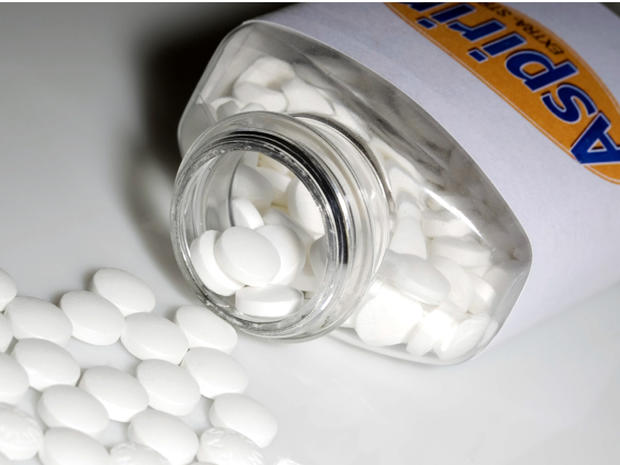Cancer deaths less common in people taking aspirin daily, study shows
(CBS News) A new cancer study finds people taking a daily dose of aspirin are far less likely to die from the diseases that will kill more than 577,000 people this year.
Study: Skin cancer risk reduced by taking aspirin, ibuprofen
Watch: Aspirin: Can it stem growth of cancer?
Aspirin therapy: Study raises safety issues
The study, published August 10 in the Journal of the National Cancer Institute looked at 100,000 people - mostly elderly - and found those who reported daily aspirin use were 16 percent less likely to die from cancer, compared with people who don't take aspirin every day.
Taking aspirin daily has been tied to cardiovascular benefits, such as protection against heart attack risk seen in takers. Previous research of people taking aspirin for five years or longer has showed a 37 percent reduction in cancer death rates, compared to people who weren't taking the chalky white pill.
The new study found a lower rate of protection than the earlier research, possibly because it combined those who took it for five years and those who took it daily for a shorter period of time. Still, the overall reduction in death risk was driven by a 40 percent reduced risk of dying from cancers of the gastrointestinal tract, including esophageal, stomach and colon cancers and a 12 percent lower mortality from remaining types of cancers.
"Even a relatively modest benefit with respect to overall cancer mortality could still meaningfully influence the balances of risk and benefits of prophylactic aspirin use," write the authors, led by Dr. Eric Jacobs, strategic director of pharmacoepidemiology at the American Cancer Society.
The study was observational in nature, meaning no cause and effect was shown and other factors may have led to a reduction in cancer risk. Reuters also points out that the study may have been limited by "detection bias," in that people taking aspirin who raised their risk for gastrointestinal bleeding - a potential side effect - were more likely to get checked by a doctor who may catch cancer early, prolonging the patient's life.
"It is still premature to recommend people start taking aspirin specifically to prevent cancer," Jacobs added to MyHealthNewsDaily, saying committees who write treatment guidelines will take all the evidence into account before making such recommendations.
Dr. John Baron, professor of medicine at the University of North Carolina at Chapel Hill and author of an accompanying commentary in the same journal issue, exercised caution and said people planning on starting aspirin should speak to a doctor, telling TIME, "Aspirin is a real drug, with definite toxicity. Just because aspirin is effective does not mean it necessarily should be used."
Studies previously published in March by The Lancet found men and women who took aspirin daily for three years were 25 percent less likely to develop cancer and those who had cancer, were 36 percent less likely to have it spread to other organs. The research also tied daily aspirin to a 46 percent lower risk for colon, lung and prostate cancers and an 18 percent lower risk for bladder and kidney cancer.
IAvoiding tobacco, limiting alcohol intake, maintaining a healthy weight and protecting your skin from the sun have been shown to reduce cancer risk.
The National Cancer Institute has more on cancer prevention.
